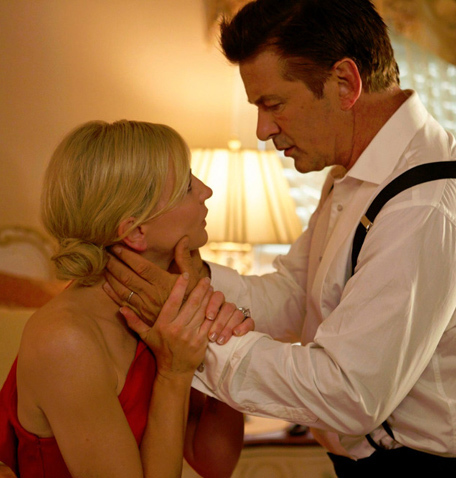 Any screenwriter that chooses to set back to back scripts in Paris then Rome, is either incredibly desperate for a vacation or named Woody Allen. While Allen’s work abroad was definitely not a vacation, the filmmaker returns to the American narrative setting with a refreshed fervor that “Midnight in Paris” and “To Rome With Love” never managed to capture on screen. With his latest film “Blue Jasmine,” the writer/director comes back to the United States with revived passion and crafts a story that is fresh, exciting, and representative of why the four-time Oscar winner is so well-respected in the industry.
Any screenwriter that chooses to set back to back scripts in Paris then Rome, is either incredibly desperate for a vacation or named Woody Allen. While Allen’s work abroad was definitely not a vacation, the filmmaker returns to the American narrative setting with a refreshed fervor that “Midnight in Paris” and “To Rome With Love” never managed to capture on screen. With his latest film “Blue Jasmine,” the writer/director comes back to the United States with revived passion and crafts a story that is fresh, exciting, and representative of why the four-time Oscar winner is so well-respected in the industry.
Even before the first line of dialogue, “Blue Jasmine” is pure Allen filmmaking. With it’s pre-1960’s bubbly French soundtrack and odd opening credit sequence, the audience cannot help but feel like they are being set up for another offbeat, nostalgic romance in the same vain of the filmmaker’s more recent work. When introduced to Jasmine (Cate Blanchett), however, all hope for a happy love story vanishes. To put it as nicely as possible, Jasmine has more than just a few problems. But who wouldn’t. Her husband Hal (Alec Baldwin) was a financial villain even worse than Bernie Madoff, after all.
 Allen’s screenplay perfectly juxtaposes Jasmine’s current condition with her happy past. In a classic example of the blinding effects of wealth, Jasmine is shown time after time indulging in the upscale Park Avenue lifestyle of the rich and famous all while Hal is secretly cheating — romantically and financially — behind her back. This cinematic hindsight Allen gives the audience, adds anticipation to these flashbacks and makes Jasmine’s current position that much more tragic. As an audience, we cannot wait for Jasmine to discover her husband’s financial promiscuity, yet at the same time, do not want to see her fall as low as her current emotional state. This back and forth story structure also provides a perfect outlet for Blanchett to mesmerize the audience with an Oscar worthy performance.
Allen’s screenplay perfectly juxtaposes Jasmine’s current condition with her happy past. In a classic example of the blinding effects of wealth, Jasmine is shown time after time indulging in the upscale Park Avenue lifestyle of the rich and famous all while Hal is secretly cheating — romantically and financially — behind her back. This cinematic hindsight Allen gives the audience, adds anticipation to these flashbacks and makes Jasmine’s current position that much more tragic. As an audience, we cannot wait for Jasmine to discover her husband’s financial promiscuity, yet at the same time, do not want to see her fall as low as her current emotional state. This back and forth story structure also provides a perfect outlet for Blanchett to mesmerize the audience with an Oscar worthy performance.
It takes a special actor to transform a character that flies first-class even when she is broke, and says things like “who do I need to have sex with to get a Stoli martini,” into a likeable, relatable character. Blanchett succeeds by turning Jasmine into a born-again child. Instead of functioning like an adult, Jasmine talks to herself, lies, and cries uncontrollably. After moving in with her adopted sister in San Francisco, she continues this trend, and manages to alienate herself from the rest of the city in the process.
Blanchett’s performance truly comes into fruition with her many drug and alcohol infused monologues. The Oscar winning actor gives of herself fully in these scenes, especially the discussion she has with her sister’s children at a pizza restaurant, and brings a dynamic to the character that tells the audience that all hope is lost.
 “Blue Jasmine” is a drastic dramatic turn away from Woody Allen’s recent filmography. Despite a few lighter moments, fueled mostly by supporting cast members Chili (Bobby Cannavale) and Al (Louis C.K.), the film isn’t so much “blue” as it is black. In the end, Jasmine is doomed because she is nostalgic for a life she will never have back.
“Blue Jasmine” is a drastic dramatic turn away from Woody Allen’s recent filmography. Despite a few lighter moments, fueled mostly by supporting cast members Chili (Bobby Cannavale) and Al (Louis C.K.), the film isn’t so much “blue” as it is black. In the end, Jasmine is doomed because she is nostalgic for a life she will never have back.
Nostalgia does not apply to my feelings about the film. I welcome Allen’s return to stories rooted in America with open arms, and applaud Sony Classics for giving the filmmaker room to tell them.
By David Morris
http://www.sonyclassics.com/bluejasmine/














